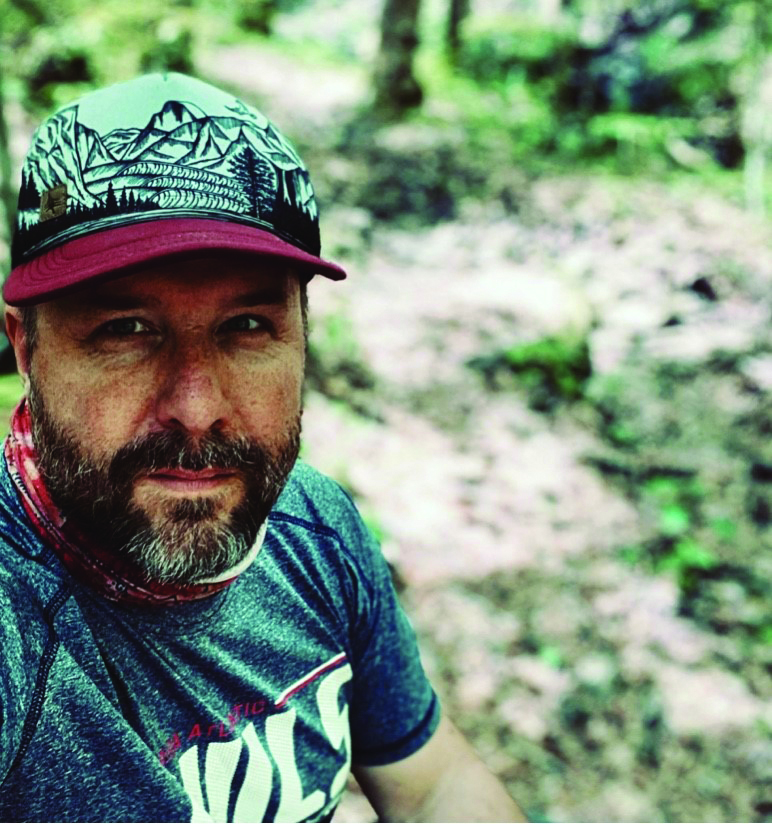

Scott Honeycutt
Scott Honeycutt has a Ph.D. in American literature and lives in Johnson City, Tennessee. He is an associate professor of English at East Tennessee State University. When he is not teaching, he enjoys hiking and spending time with his daughters. In addition to his poetry, he also writes nonfiction and draws maps.
A! Mag: Do you remember the first poem you wrote? If so, tell us about it and why you wrote it.
Honeycutt: I was 12 or 13 when I wrote my first poem. I was attempting to write in a gothic mode, meaning I was going for something dark and spooky. It’s pretty terrible, but I still have it in a file somewhere at the bottom of a closet. Those early attempts at creation are crucial to anyone who wants write or paint or draw or dance or sing or ...
A! Mag: How did you get interested in writing poetry?
Honeycutt: When I was a child, my mother would read Edgar Allan Poe’s poetry to me – “The Ravens,” “Bells,” “The Undead,” what fun! Most teenagers love Poe, and I was no different. Also, one time an uncle once asked me, “Have you ever read the poem “The Tyger” by William Blake?” I hadn’t but soon after, I did, and it gobbled me up.
A! Mag: What poets serve as inspiration?
Honeycutt: I heard somewhere that all American poets are the sons and daughters of Walt Whitman. After all, Whitman thought that America itself was the greatest poem. In “Song of Myself” he exclaims “I speak the password primeval, I give the sign of democracy. By God, I will accept nothing which all cannot have their counterpart of on the same terms.” Who besides Whitman would think to write such audacious lines? He gazes beyond our horizons and sings about a hope for the future. I love that.
Besides Whitman, I’m also inspired by the poems of Mary Oliver, Ranier Maria Rilke, Samuel T. Coleridge, Allen Ginsberg, Lawrence Ferlinghetti, Robinson Jeffers, Philip Larkin and Natasha Tretheway, to name a few.
A! Mag: What subjects are inspiration for your poetry?
Honeycutt: Well, there’s always nature of course. Years ago, I attended an open mic and the MC exclaimed, “Now come up here and give us your most radical works, and we don’t want any of that silly Robert Frost stuff.” I remember thinking, “Wait, what?, I love Robert Frost!” Humans often believe that we are the most interesting thing on this planet, but I’m not convinced. Even though most of my poems include people, they are almost always launching, for better or worse, outside somewhere.
A! Mag: What poetic forms do you tend to use?
Honeycutt: Writing is very difficult for me, and I don’t consider myself an accomplished poet. While I have played with form, I mostly write in free verse. Narrative form, free verse seems to be dominant in contemporary American poetry.
A! Mag: What is the importance of poetry in our world today?
Honeycutt: I’m not so sure about importance of poetry in the world today – but clearly we need it. Reading and writing poetry has, hopefully, helped me to become a more observant person. It helps me stay in the present and to be aware of surroundings, of my senses. It helps me be a better listener, too. Also, poets and artists have long been aware of the notion a shadow self or daemon (not demon!) that speaks through their poems. This daemon could be called a poetic voice or individual spirit; it helps poets say in verse what they might otherwise not utter in person, face to face. The daemon takes experience and memory and transforms it into art. We need more of this transformation.
A! Mag: What are some publications where your poetry can be found?
Honeycutt: My poems can be found in various regional anthologies like “The Southern Anthology of Poetry: Virginia”, and “Kentucky Writers: The Dues Loci and the Lyrical Landscape”, along with journals like Jimson Weed and Still: the Journal. I have also published two chapbooks, “Twelve Miles North of the Ohio River” and “This Diet of Flesh.”
A! Mag: What awards have you received?
Honeycutt: I have won a couple of regional awards for poetry – first place Jimson Weed (2017) and first place poetry Tennessee Society for Poetry –Northeast Region (2015).
May Poem, Roan Mountain
Some truths we only realize in mountains
or under branches of gnarled trees that creak in stillness.
These truths deliver time into our palms, almost.
It’s what lurks, beyond and unseen yet felt, in the green-masked
sheen of rhododendron leaves that rush up a hillside, brambles
bounding out like fire.
Even though the meaning eludes like smoke along ridgelines,
It’s here.
And even though sometimes it surprises and breaks through,
looming like a bear on the campfire’s edge,
it will not feed from our hands, nor will it stay:
it can only inch close to flames before turning round
those chocolate eyes and heading back into the forest.
Reprinted with permission.